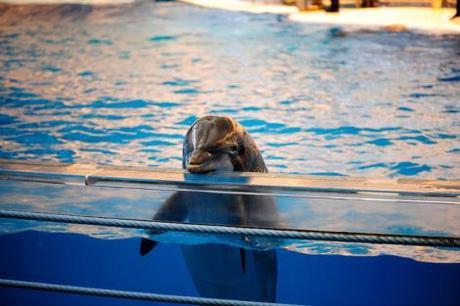by Stephen Messenger / Treehugger

Dolphins have long been one of our favorite ocean-going animal counterparts, blurring the line that separates human intelligence and emotion from the wildness of nature. Sadly, though, this attraction has resulted in dolphins around the world being exploited for our entertainment, subjected to a life in captivity.
But now, in a bold move to protect the well-being of dolphins, India has moved to ban dolphin shows – a push that helps elevate their status from creatures of mere curiosity to one that borders more closely to that of personhood.
Late last week, India’s Minstry of the Environment and Forests released a statement banning “any person / persons, organizations, government agencies, private or public enterprises that involves import, capture of cetacean species to establish for commercial entertainment, private or public exhibition and interaction purposes whatsoever.”

“Whereas cetaceans in general are highly intelligent and sensitive, and various scientists who have researched dolphin behavior have suggested that the unusually high intelligence; as compared to other animals means that dolphin should be seen as ‘non-human persons’ and as such should have their own specific rights and is morally unacceptable to keep them captive for entertainment purpose,” reads the ministry’s statement.

In the U.S., similar efforts on the part of animal rights organizations have failed to gain traction in courts, leaving the door open for both dolphins and orcas to be held in captivity and paraded for our entertainment. The stark realities of this life, held in small pools on the grounds of marine parks, can best be seen from overhead — as with this facility in Florida, a stone’s throw from animals’ vast ocean habitat.
It’s no wonder then, that India’s move to abolish captivity for dolphins is being looked upon, among animal rights supporters, as a big step in the right direction.
“This is a huge win for dolphins,” says Ric O’Barry of the Earth Island Institute’s Dolphin Project. “Not only has the Indian government spoken out against cruelty, they have contributed to an emerging and vital dialog about the ways we think about dolphins – as thinking, feeling beings rather than pieces of property to make money off of.”

